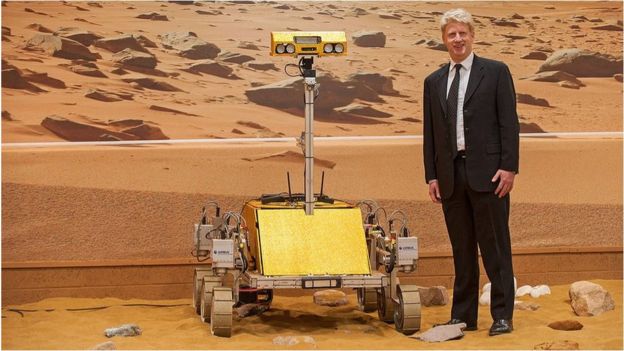Europe’s science ministers to decide on ExoMars rover
 Nov. 26: European research ministers will be asked for a little over €400m (£345m; $430m) to put a rover on Mars in 2021 when they meet next week.
Nov. 26: European research ministers will be asked for a little over €400m (£345m; $430m) to put a rover on Mars in 2021 when they meet next week.
This is the additional sum needed to finish building the European Space Agency’s much-delayed ExoMars robot.
A technical review has just concluded that the project is running true to its latest schedule, but it can only go forward with full funding.
Ministers will decide ExoMars’ fate at a council in Lucerne, Switzerland.
The British-assembled rover would launch on a Russian rocket in August 2020 and land on the Red Planet eight months later.
It is being designed with the ability to drill up to 2m below Mars’ dusty terrain to look for evidence of microbial activity.
Dr David Parker is Esa’s director of Human Spaceflight and Robotic Exploration. He said member-state delegations to the agency had been expressing strong support for the project in the run-up to the Lucerne gathering.
“The rover remains scientifically compelling because there is no other mission planned to go below the surface of Mars which is damaged by radiation and which would destroy any past or present life,” he told BBC News.
The six-wheeled robot is the second mission in a two-step venture that Europe is conducting with the Russians.
The first phase has just seen a satellite to study Mars’ atmosphere go into orbit around the planet, and a disc-shaped probe called Schiaparelli try to make a demonstration landing on its surface.
Schiaparelli crashed but engineers say they learned important lessons that can now be applied to the rover’s touch-down bid in four years’ time.
But to be in such a position, the six-wheeled vehicle will need the nod of ministers in Lucerne.
Ahead of this council, Esa and its Russian counterpart, Roscosmos, have conducted a thorough review of the project’s technical status, to establish that all the mission’s hardware can be made ready in time.
It was fears that some elements would be late that saw the mission slip earlier this year from its intended 2018 launch.
The required equipment goes beyond just the rover and a suite of scientific instruments. It includes also a “cruise ship” to carry the vehicle to Mars (this will come from Germany) and the mechanism to land the robot on the surface (a major Russian contribution).
“There has been intense technical work by the project members, including the industrial team led by Lavochkin (Russia) and Thales Alenia Space (Italy), which has now established an adequate schedule margin for launch at the overall system level and within the pieces of the system; so, the rover and the carrier, and so on,” explained Dr Parker.
It has been recommended that in order to shorten the timeline on what had previously been proposed, all the different elements will now be sent to an experienced facility in Toulouse, France, for final integration and testing – and only afterwards go to the launch site at Baikonur in Kazakhstan.
Originally, final integration and testing was to be done at the spaceport.
It is on the basis of the positive status report delivered this week to member state delegations that the funding request will now go forward to ministers.
The little over €400m includes more than €300m for industry with the rest to cover Esa’s internal costs.
These include preparing the mission control centre that will command the rover on the surface of Mars.
‘Dumbed-down’ rover
But additional to all this money, member states will have to provide at some future point the funds to support the surface operation of the vehicle – assuming it gets down safely.
The expectation is that the robot will explore the Red Planet for at least 218 Martian days; hopefully much longer.
The two leading Esa countries in the ExoMars rover project are Italy and the UK. Both have indicated they will be offering substantial financial support at the Lucerne meeting.
But it will require others in the 22-nation organisation to dig deep as well.
Ministers will be discussing a great swathe of programmes in Switzerland, including continued participation in the space station and the development of future Earth observation satellites.
For some nations, these alternative projects will be more important to them. Full commitment to ExoMars is not guaranteed, therefore.
And even if all the funds are forthcoming, some issues of contention will no doubt persist.
For example, there is currently an ongoing argument centred around the rover’s use of autonomous navigation – the ability of the vehicle itself to plot the best path across the surface of Mars once instructed to go to a particular location.
This feature – a UK development – was long considered an integral part of the mission, but has now been removed from the current design on the grounds of cost.
Researchers though are likely to continue to press for its reinstatement because a robot that drives quickly and efficiently can do much more science in the time available – never mind the clear industrial spin-out potential from such technology. bbc.com
